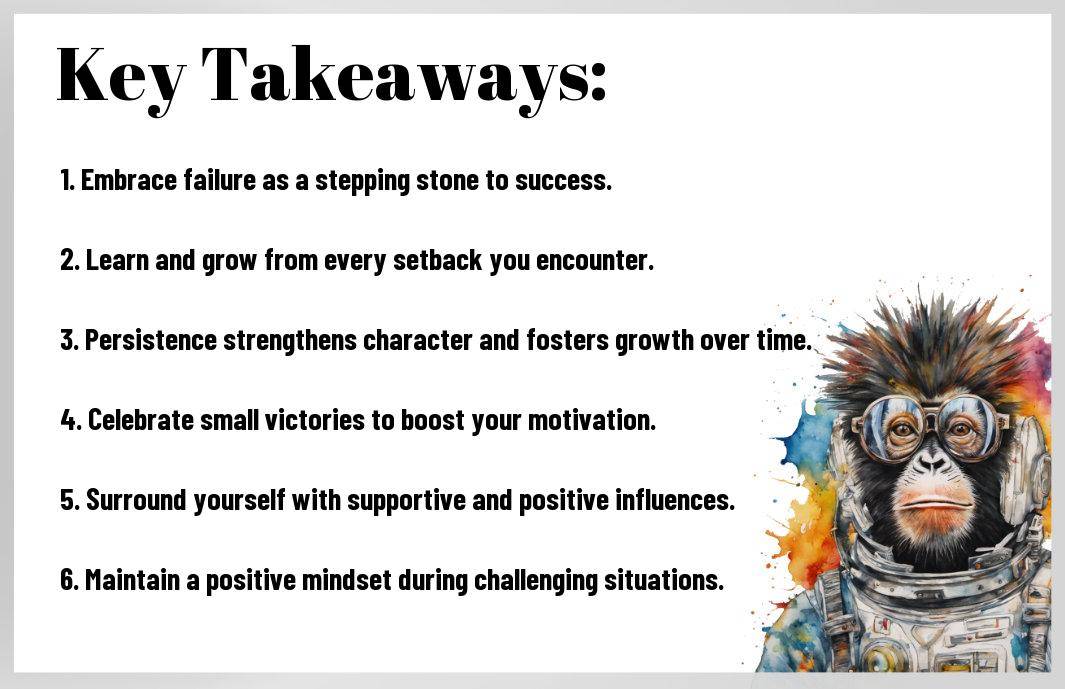It’s vital to understand that resilience is not just about enduring life’s challenges; it’s about actively bouncing back with strength and determination every time you experience a setback. In this post, I’ll explore how you can cultivate your own resilience, enabling you to navigate obstacles effectively and emerge even stronger. By adopting a mindset that embraces failure as a learning opportunity, you’ll find that your ability to rise from adversity can significantly enhance your personal and professional growth.

Key Takeaways:
- Resilience is the ability to bounce back from challenges and setbacks.
- Growth mindset fosters resilience; believing you can develop your abilities encourages perseverance.
- Emotional regulation is vital; managing emotions helps navigate difficulties effectively.
- Support systems play a key role; having a network of friends and mentors provides encouragement and guidance.
- Adaptability is vital; being open to change and new strategies enhances resilience.
- Self-compassion promotes healing; being kind to oneself during tough times reduces pressure and fosters recovery.
- Reflection helps in learning; analyzing experiences can provide insights that strengthen your resilience going forward.

Understanding Resilience
While resilience is often seen as a buzzword, it is a profound quality that empowers us to overcome adversity. It’s about bouncing back after challenges and growing from those experiences. If you’re curious about its origins, you might want to check out who wrote if your greatest glory is not in never falling but in rising …. This concept remains imperative for personal growth and transformation.
Definition and Importance
Beside being a simple definition of resilience, its importance lies in its ability to help you navigate life’s challenges effectively. I find that embracing resilience enables you to adapt and thrive, even when facing significant obstacles. This adaptability not only fosters a growth mindset but also enhances overall well-being.
Psychological Benefits
With resilience comes a multitude of psychological benefits that can drastically improve your mental health. By nurturing this trait, you can develop healthier coping strategies, reduce stress levels, and enhance your emotional intelligence. These advantages become critical in your journey towards personal fulfillment.
Another vital aspect of the psychological benefits of resilience is its role in building self-confidence and emotional stability. As you face and overcome obstacles, you realize that you are capable of handling whatever comes your way. This realization fosters a positive self-image and helps you maintain a more optimistic outlook on life. Additionally, by learning to view setbacks as opportunities for growth, you develop a proactive mindset, allowing you to approach future challenges with greater courage and determination.
The Process of Building Resilience
Some may believe that resilience is an inherent trait, but I know it’s a skill that one can develop over time. The process involves understanding challenges, nurturing a positive mindset, and actively seeking growth opportunities. By embracing setbacks as part of the journey, I can cultivate stronger emotional and mental fortitude, allowing me to rise each time I fall.
Mindset Shifts
Mindset is the foundation of resilience. It is vital to adopt a growth mindset, which means seeing obstacles as opportunities for learning and improvement. When you shift your perspective to focus on what you can control and learn from your experiences, you empower yourself to face challenges with a renewed sense of strength and determination.
Skill Development
Mindset alone isn’t enough; skill development plays a pivotal role in building resilience. As I identify various challenges, enhancing my problem-solving abilities, emotional regulation, and stress management techniques becomes vital. This combination will not only equip you to better handle adversity, but it also reinforces your ability to bounce back stronger.
But developing skills isn’t just about acquiring new techniques; it’s about practicing them consistently. Engaging in activities like mindfulness, effective communication, and self-reflection can profoundly impact your resilience. When you take the time to invest in these skills, you’re vitally creating a toolkit that allows you to navigate life’s challenges with confidence and clarity. Each skill mastered enhances your ability to face adversity and ultimately rise again, no matter how many times you may fall.

The Role of Failure in Resilience
All successful journeys involve encountering failure along the way. I believe that embracing these moments is vital for developing TO WIN IS TO RISE EACH TIME YOU FALL. Each setback teaches important lessons that strengthen your resolve and prepare you to face future challenges with greater confidence. By understanding that failure is not the end, but rather a stepping stone, you can build greater resilience and transform adversity into opportunity.
Learning from Setbacks
Above all, setbacks provide valuable insights that can guide your future efforts. I have found that reflecting on what went wrong helps me identify areas for improvement. Instead of viewing failure as a dead end, you can see it as a chance to grow and refine your approach.
Embracing Challenges
About embracing challenges, I’ve learned that they are not to be feared but welcomed. Each obstacle you encounter is an opportunity to test your limits and enhance your skills. By approaching challenges with a positive mindset, I have been able to find creative solutions that I might have otherwise overlooked.
Another key aspect of embracing challenges is the *personal growth* that accompanies them. You may find that stepping outside of your comfort zone can lead to *increased confidence* and *better problem-solving skills*. While it’s tempting to shy away from tough situations, facing them can *transform weaknesses into strengths*. Cultivating a proactive attitude allows you to embrace change and tackle adversity head-on, ultimately leading to a more fulfilled and resilient life.
Practical Strategies for Cultivating Resilience
Despite the challenges we face, cultivating resilience is a deliberate process that involves incorporating various strategies into our daily lives. By adopting practical approaches, you can enhance your ability to bounce back from setbacks and maintain a positive outlook. Focusing on small, actionable steps can help you build strength and improve your overall well-being, even in the face of adversity.
Emotional Regulation Techniques
Beside practicing mindfulness and breathing exercises, I find it vital to develop emotional regulation techniques to manage stress effectively. By identifying triggers and utilizing methods like journaling or engaging in creative activities, you can create a healthier emotional landscape that allows for better responses during difficult times.
Support Networks
To truly foster resilience, surrounding yourself with a strong support network is vital. I have found that reaching out to friends, family, or even support groups can provide the encouragement and perspective needed to navigate life’s challenges.
At the heart of a robust support network are the connections that empower you during tough times. These relationships can offer not just emotional backing, but also practical advice and resources when you need them most. By sharing your struggles with others, you create an atmosphere of accountability and understanding, which can significantly enhance your resilience. When you build these valuable connections, you equip yourself with the tools necessary to face adversity head-on, knowing you’re not alone in your struggles.
Resilience in Different Contexts
For many, resilience manifests in various forms depending on the context. Whether it’s personal challenges or professional setbacks, the ability to bounce back is shaped by our experiences and environments. I believe understanding these different areas helps to deepen our capacity for resilience and equips us to handle life’s unpredictable nature effectively.
Personal Life
After facing emotional challenges, I learned that resilience is not just about enduring pain but also about growing from it. Each setback in personal life felt like a lesson, and I found that embracing my vulnerabilities allowed me to rise stronger each time I fell.
Professional Environment
Behind every triumph in my career lies a story of resilience. I’ve encountered numerous obstacles, often feeling overwhelmed by tight deadlines and demanding expectations. However, these moments taught me that embracing discomfort and challenges is vital for growth.
Even in the most demanding situations, I discovered that resilience in a professional environment is about maintaining a positive mindset. You may face pressure from deadlines or high-stakes projects, but it’s important to view these challenges as opportunities for growth. While overwhelming, the journey teaches you invaluable lessons in time management and prioritization. A key lesson is to develop strong support systems, allowing you to share burdens and gain diverse perspectives. Ultimately, your ability to adapt and learn from these experiences will not only improve your professional performance but also enhance your overall resilience.
Inspiring Stories of Resilience
Once again, I am reminded of the power of the human spirit through The Race: Attributed to Dr. D.H. “Dee” Groberg, a story that embodies tenacity and determination. It illustrates how setbacks can become stepping stones toward greater achievements. Each story of resilience inspires me to rise every time I fall, demonstrating that perseverance is the key to overcoming adversities.
Case Studies
Studies indicate the significance of resilience through various case studies that highlight effective coping strategies:
- Case Study 1: Survivor of a severe accident who returned to sports within a year, demonstrating remarkable physical and mental fortitude.
- Case Study 2: A single parent who overcame poverty by establishing a successful small business, showcasing the benefits of hard work and dedication.
- Case Study 3: An immigrant who faced discrimination yet built a thriving community organization, illustrating the impact of unity and resilience.
- Case Study 4: A military veteran battling PTSD who engaged in creative arts therapy to reclaim control, emphasizing the healing power of expression.
Lessons Learned
Below are key insights derived from these case studies that can guide you in developing your own resilience:
Considering the various experiences of resilient individuals, it is evident that facing adversity head-on can lead to personal growth. Engaging in a supportive community and maintaining a positive mindset enables you to navigate challenging situations effectively. Moreover, learning to embrace failure as part of the journey rather than as a defeat enhances your capacity to recover. Through these stories, I have gathered that the most effective way to cultivate resilience is to stay adaptable, draw strength from one’s experiences, and persistently strive towards your goals despite setbacks.
To wrap up
Drawing together my thoughts on resilience, I understand that the journey of rising each time you fall is not just about overcoming obstacles, but also about personal growth. It encourages you to embrace your challenges and learn from your experiences. I believe that each setback is an opportunity to rebuild and strengthen your spirit. By fostering this mindset, you equip yourself with the tools necessary to face whatever life throws your way, ultimately leading to greater success and fulfillment.
FAQ
Q: What does the concept of resilience mean?
A: Resilience refers to the ability to bounce back from setbacks, adapt to challenging circumstances, and keep moving forward despite difficulties. It involves coping strategies, emotional strength, and the capacity to find meaning in adversity.
Q: How can I build resilience in my daily life?
A: Building resilience can be achieved through several practical strategies. Establishing a strong social support system, practicing self-care, managing stress effectively, setting realistic goals, and maintaining a positive outlook are all important practices that can strengthen resilience over time.
Q: Why is it important to rise each time you fall?
A: Rising each time you fall is important because it fosters growth and learning. Life’s challenges can provide valuable lessons that contribute to personal development. Each time you face and overcome an obstacle, you become more equipped to handle future difficulties, ultimately contributing to a stronger sense of self-efficacy.
Q: Can resilience be developed, or is it an inherent trait?
A: Resilience is not solely an inherent trait; it can be developed through experiences, learning, and conscious effort. While some people may have a natural tendency toward resilience, anyone can enhance their resilience skills through practice, reflection, and support from others.
Q: How do I support someone who is struggling to regain their resilience?
A: Supporting someone struggling with resilience involves being a compassionate listener, offering encouragement without judgment, and helping them explore their feelings and feelings. Encouraging them to take small steps towards recovery, suggesting they seek professional help if needed, and celebrating their progress can all contribute positively to their journey.
Q: What role does mindset play in resilience?
A: Mindset plays a significant role in resilience. A growth mindset—the belief that abilities and intelligence can be developed—encourages individuals to view challenges as opportunities for growth rather than threats. Adopting a positive mindset can enhance one’s capacity for resilience by promoting adaptability and perseverance in the face of difficulties.
Q: Are there any practices I can incorporate to enhance my resilience daily?
A: Yes, incorporating daily practices such as mindfulness meditation, journaling, setting achievable goals, and engaging in physical activity can enhance resilience. Developing a gratitude practice and connecting with others also fosters emotional well-being and can aid in building a more resilient mindset over time.



